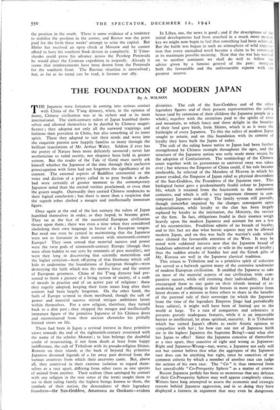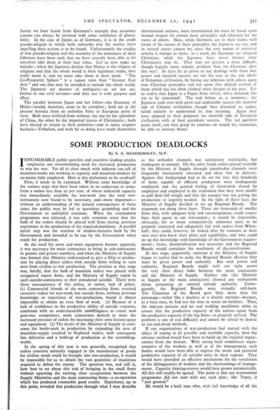THE FOUNDATION OF MODERN JAPAN
By A. WILSON
THE Japanese were fortunate in coming into serious contact with China of the T'ang dynasty, when, in the opinion of many, Chinese civilisation was at its richest and at its most international. The sixth-century rulers of Japan humbled them- selves and allowed themselves to be dazzled by Chinese magni- ficence ; they adopted not only all the outward trappings and fashions then prevalent in China, but also something of its inner spirit. These they adapted to suit their needs and wove into the exquisite pattern now happily familiar to many through the brilliant translations of Mr. Arthur Waley. Seldom if ever has the poetry of Nature been more delicately savoured ; never has aestheticism so ruled society, nor elegance been held in greater esteem. But the reader of the Tale of Genji must surely ask himself whether the Japanese of the time through their exclusive preoccupation with form had not forgotten the significance of its content. The external aspects of Buddhist ceremonial or the voice and diction of a priest called in to pray beside a death- bed were certainly of greater moment to the contemporary Japanese mind than the eternal verities proclaimed, or even than the graces sought. Outwardly they carried Chinese tendencies to their logical conclusion ; but there is more than a suspicion that the superb robes clothed a meagre and intellectually immature figure.
Once again at the end of the last century the rulers of Japan humbled themselves• in order, as they hoped, to become great. They sat at the feet of the successful European civilisation thrust upon them ; there was even a time when they considered abolishing their own language in favour of a European tongue. But need one even be cynical in maintaining that the Japanese were not so fortunate in their contact with nineteenth-century Europe? They soon sensed that material success and power were the twin gods of nineteenth-century Europe (though they were often hidden to our eyes by remnants of past morality), nor were they long in discovering that scientific materialism and the higher criticism—both offspring of that Germany which still bids to undermine the foundations of European thought—were destroying the faith which was the motive force and the source of European greatness. China of the T'ang dynasty had pre- sented to them a picture of a living system of society, of a code of morals in practice and of an active pair of religions : these they eagerly adopted, keeping their form intact long after their content had been largely forgotten. On the other hand, the faith of Europe seemed to them moribund, though the cult of power and material success stirred antique ambitions latent within themselves. For a new religion, therefore, they turned back to a dim past ; they stripped the meagre and intellectually immature figure of the primitive Japanese of his Chinese dress and reconstructed from their ancient chronicles his pitifully limited views on life.
There had been in Japan a revived interest in these primitive views towards the end of the eighteenth-century associated with the name of the scholar Motoori ; to him belongs the doubtful credit of resurrecting, if not from death at least from happy indifference, the cult of Tribalism with its pseudo-religion Shinto. Remote on their islands at the back of beyond the primitive Japanese dreamed legends of a far away past derived from the various countries from which their ancestors came. But, above all, they contrived in their extreme isolation to regard them- selves as a race apart, differing from other races as one species of animal from another. Their realism (then untinged by contact with any religion in the true sense of the term) taught them to see in their ruling family the highest beings known to them, the symbols of their nation, the descendants of their legendary foundress—the Sun-Goddess, Amaterasu no Omikami—evident
divinities. The cult of the Sun-Goddess and of the other legendary figures and of their present representatives the ruling house (and by extension of their children the Japanese people as a whole), together with the attentions paid to the spirits of river and mountain, to which fancy and sheer delight in the beauties of their land gave birth, form Shinto, which is as it were the birthright of every Japanese. To this the rulers of modern Japan sought to return, and on this foundation with its cement of loyalty they have built the Japan of today.
The cult of the ruling house native to Japan had been further strengthened by Chinese example throughout the ages, and the structure of the Japanese nation was early made more secure by the adoption of Confucianism. The terminology of the Chinese court together with its pretensions to universal sway was taken over ; but whereas the Emperor of China could, if his rule became intolerable, be relieved of the Mandate of Heaven in which his power resided, the Emperor of Japan ruled as physical descendant of the Sun-Goddess, the Foundress of the Japanese race. This biological factor gave a predominantly feudal colour to Japanese life, which it retained from the fourteenth to the nineteenth centuries, and which is still a very important element in con- temporary Japanese make-up. The family system still prevails, though somewhat impaired by the changes consequent upon industrialisation, while loyalty to the clan has been largely replaced by loyalty to the institution, the Ministry, the service or the firm. In fact, obligations feudal in their essence weigh heavily upon the modern Japanese and account for not a few of his eccentricities. Feudalism admits of no breach of loyalty, and to this fact are due what heroic aspects may yet be allowed modern Japan, and on this was built the warrior's code which once claimed the favourable attention of the West. It may be noted with saddened interest now that the Japanese brand of feudalism admitted of any atrocity or wile in the name of loyalty ; thus the sudden attacks of Sunday last and the Greek gifts of Mr. Kurusu are well in the Japanese classical tradition.
This return to Tribalism and to a primitive spirit of cohesion has served as a bulwark against many of the corrosive tendencies of modern European civilisation. It enabled the Japanese to take on most of the material aspects of our civilisation with com- parative success, while still retaining their individuality. Had it encouraged them to stay quiet on their islands instead of re- awakening and reaffirming in their breasts in more positive form latent dreams of a mission to force others to share in the benefits of the paternal rule of their sovereign (to which the Japanese from the time of the legendary Empress Jingo had periodically been subject), it might well have been of limited use to the world at large. To a race of conquerors and colonisers it presents gravely inadequate features, while it is an impassable barrier to intellectual, let alone spiritual, maturity. It is Tribalism which has ruined Japan's efforts to excite Asiatic opinion to sympathise with her ; for how can one not of Japanese birth see in the highest Japanese the Supreme Being?—and what else has Japan to offer? Since the Japanese conceive of themselves as a race apart, they conceive of right and wrong as Japanese- Right and Japanese-Wrong—nay, worse, a Japanese not only will not but cannot believe that what the aggregate of the Japanese race does can be anything but right, since he conceives of no common criteria by which a member of another race can judge the actions of his own race. The " Co " is thus removed from her unrealisable " Co-Prosperity Sphere " as a matter of course.
Recent Japanese perfidy has been so monstrous that any defence of their Co-Prosperity Sphere may well appear completely otiose. Writers have long attempted to assess the economic and strategic reasons behind Japanese aggression, and in so doing they have displayed a fairness .in argument that may even be dangerous.
Surely we have learnt from Germany's example that economic reasons can always be invested with some semblance of plausi- bility. In the case of Japan, as of Germany, it is in the crude pseudo-religion to which both subscribe that the motive force impelling their actions is to be found. Unfortunately the crudity of that pseudo-religion and the enormity of the utterances of their followers have been such that we have scarcely been able to let ourselves take them at their face value. Let us now make no mistake ; when the Japanese declare that Shinto is the religion of religions and that the whole world is their legitimate realm, they really mean it, and we must take them at their word. " The Co-Prosperity Sphere " is a vaguer term than " Greater East Asia" and one that may be intended to include the whole world. The Japanese are masters of ambiguity—an art not un- known to our civil servants—and they use it with purpose and effect.
The parallel between Japan and her fellow—the Germany of Hitler—would, therefore, seem to be complete ; both are at the present heretics from an orthodox Sinic or European point of view. Both were civilised from without, the one by the splendour of China, the other by the imported leaven of Christianity ; both have elected to return to their primitive—and in many respects barbaric—Tribalism, and both by so doing have made themselves international outlaws, since international life must be based upon mutual respect for certain basic principles and tolerance for the views of others. Now, while Germans are in their hearts well aware of the nature of these principles, the Japanese are not, and in several senses cannot be, since the very notion of universal criteria is foreign to them: in a word, the Germans are relapsed Christians, while the Japanese have never known what Christianity may be. They may yet present a more difficult, though happily more remote, problem than the Germans after this war! At least let us prove in our dealings with them that power and material success are not the true or the sole ideals of European civilisation, by basing our relations with others upon true Christian principles and not upon that diluted. version of them which has too often cloaked other designs in the past. Let us realise that Japan is a Pagan State which, when defeated, has yet to be .converted! The task before us is immense : the Japanese took over with great and undeniable success the material side of Chinese civilisation, though they distorted or, rather, failed entirely to understand its true meaning. Again they have adapted to their purposes the material side of European civilisation with at least pecuniary success. The sad question poses itself, can they grasp its content—or would we, victorious, be able to instruct them?



























 Previous page
Previous page